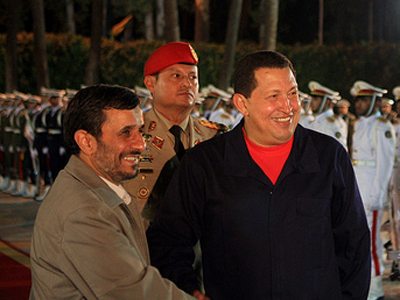The Fraying Iran-Venezuela Alliance
Concerns about the anti-American alliance of Ahmadinejad and Chávez are overblown.
 Senator Richard Lugar recently warned of the growing threat posed by the Venezuela-Iran alliance. Lugar’s concern is a scenario in which Iran manages to block transit through the Strait of Hormuz, giving Venezuelan president Hugo Chávez the opportunity to deal Washington a “double blow” by simultaneously cutting off oil exports to the United States.
Senator Richard Lugar recently warned of the growing threat posed by the Venezuela-Iran alliance. Lugar’s concern is a scenario in which Iran manages to block transit through the Strait of Hormuz, giving Venezuelan president Hugo Chávez the opportunity to deal Washington a “double blow” by simultaneously cutting off oil exports to the United States.
On the surface, this may seem worrying. The two countries have a long tradition of trying to rile oil markets through a combination of bravado—Iran recently announced that it will preempt EU sanctions by halting oil sales to Britain and France—military exercises and repeated vows to cripple the United States any way they can.
Chávez has proven willing to use Venezuelan oil for his political ends, primarily by doling out fuel subsidies to his regional allies but also by delivering oil products to Iran in clear defiance of international sanctions. Yet despite his bluster, Chávez has kept the oil flowing north since he came into office, except for brief period in 2002–2003 when a worker’s strike against Chávez halted oil exports.
Behind the scenes, the anti-American alliance is in tatters. Key to the partnership is Iran’s ability to use Venezuela as a bridgehead for an expanded network of ties throughout Latin America. Shortly after elections brought Chávez allies to power in Bolivia, Ecuador and Nicaragua, Iran’s trade with Latin America soared, tripling from 2007–2008. To help bring those leaders closer into the fold, Venezuela and Iran pledged aid to Bolivia and Nicaragua that, when combined, amounted to more than 20 percent of each country’s GDP. Despite this, Iran’s support network in the region has thinned since 2010.
Mahmoud Ahmadinejad’s four-country tour of Latin America in January, which Lugar and others have cited as a sign of a growing Iranian presence in Latin America, actually demonstrates the decline of Iranian influence. Ahmadinejad didn’t visit Brazil, a country that championed Iran’s right to nuclear energy less than two years ago. He also didn’t go to Bolivia, which is probably the largest recipient of Iranian developmental aid in Latin America. (Iran’s bypass of Bolivia is a sign of ongoing fallout from a visit by Ahmad Vahidi, Iran’s defense minister, to Bolivia last summer. The visit drew Argentina’s ire because the former Quds commander allegedly had a role in the 1994 bombing of a Jewish cultural center in Buenos Aires.)
Unable to keep up the guise of broad-based diplomatic support in Latin America, the central features of the illicit relationship between Venezuela and Iran have become more apparent. As one unclassified Department of Defense report from 2010 points out, members of Iran’s Revolutionary Guard, an elite wing of Iran’s military, “have an increased presence in Latin America, particularly Venezuela.” Given the surge of Hezbollah operatives in the area, the prevailing belief is that the groups may launch retaliatory attacks against the United States or Western-oriented countries in the Americas if Iran’s nuclear installations are bombed.
There is also substantial evidence to suggest that Iran is helping mine uranium in Venezuela and that financial institutions in Venezuela have funneled money to Iran’s nuclear program. In December, a Venezuelan diplomat posted in Miami was implicated in a foiled Iranian cyber attack on the United States; if true, it is especially alarming because security experts regard the cyber arena as an area in which the playing field between Tehran and Washington is most even.
Managing the Threat
The Venezuela-Iran alliance does pose a threat to U.S. security. But it’s probably a manageable one.
Led by Undersecretary Stuart Levey, the U.S. Treasury has waged a global campaign to stop banks from laundering money for Iran’s nuclear program in recent years, and international sanctions are slowly crushing Iran’s economy.
Meanwhile, Venezuela and Iran’s spheres of influence are breaking down, and a few of their allies—Cuba and Syria—have already begun death rattles.
Playing up the threat, as a recent House Foreign Affairs Committee hearing chaired by Rep. Ileana Ros-Lehtinen tried to do, unduly politicizes the issue. Republican presidential candidates have started to call for bold action against the Venezuela-Iran tag team, although they haven’t offered any specifics other than to advocate expanding sanctions or bombing Iran. Lugar’s choice remedy is completing construction of the Keystone XL pipeline; a new energy source would undoubtedly buoy America’s energy security, but it’s hard to imagine how it would alter Chávez’s behavior in the midst of current tensions.
There’s no way to rule out the possibility of Chávez or the Iranian leadership unleashing terrorist attacks against the United States or its allies in a desperate final-hour kamikaze, but Washington shouldn’t needlessly provoke that scenario—not when the current arrangement works to America’s advantage.
Sean Goforth is author of Axis of Unity: Venezuela, Iran & the Threat to America (Potomac Books, 2012).
Image: chavezcandanga
